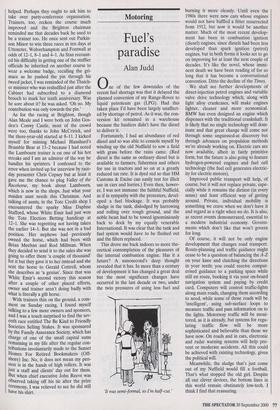Motoring
Fuel's paradise
Alan Judd
One of the few downsides of the recent fuel shortage was that it delayed the planned conversion of my Range-Rover to liquid petroleum gas (LPG). Had this taken place I'd have been largely unaffect- ed by shortage of petrol. As it was, the con- version kit remained in a warehouse because the hauliers didn't have the diesel to deliver it.
Fortunately, I had an abundance of red diesel and so was able to console myself by winding up the old Nuffield to sow a field with grass before the rains came. (Red diesel is the same as ordinary diesel but is available to farmers, fishermen and others for use in tractors and so on at a greatly reduced tax rate. It is dyed red so that HM Customs & Excise can easily test for illicit use in cars and lorries.) Even then, howev- er, I was not immune: the faithful Nuffield, as if in sympathy with the protesters, devel- oped a fuel blockage. It was probably sludge in the tank, dislodged by harrowing and rolling over rough ground, and the noble beast had to be towed ignominiously back to dock by my equally venerable International. It was clear that the tank and fuel system would have to be flushed out and the filters replaced.
This drove me back indoors to more the- oretical contemplation of the pleasures of the internal combustion engine. Has it a future? A nanosecond's deep thought revealed that it has. In more than a century of development it has changed a great deal but the most significant changes have occurred in the last decade or two, under the twin pressures of using less fuel and It was semi-formal, so I'm half-cut.' burning it more cleanly. Until even the 1980s there were new cars whose engines would not have baffled a fitter resurrected from 1912, but now it would be another matter. Much of the most recent develop- ment has been in combustion ignition (diesel) engines, since diesels had been less developed than spark ignition (petrol) engines, but in both forms it looks set to go on improving for at least the next couple of decades. It's like the novel, whose immi- nent death we have been reading of for so long that it has become a conversational convention. Ditto the decline of the Times.
We shall see further developments of direct-injection petrol engines and variable valve drive technology which, along with light alloy crankcases, will make engines lighter, cleaner and more economical. BMW has even designed an engine which dispenses with the traditional crankshaft. It is likely that no single technology will dom- inate and that great change will come not through some unguessed-at discovery but through advances on propulsion methods we're already working on. Electric cars are now available, albeit in fairly primitive form, but the future is also going to feature hydrogen-powered engines and fuel cell technology (the fuel cell generates electric- ity for electric motors).
Improved public transport will help, of course, but it will not replace private; espe- cially while it remains the dirtiest (in every sense) and least efficient way of getting around. Private, individual mobility is something we crave when we don't have it and regard as a right when we do. It is also, as recent events demonstrated, essential to a modern industrial economy. Govern- ments which don't like that won't govern for long.
Of course, it will not be only engine development that changes road transport. Route-planning and traffic guidance might cease to be a question of balancing the A-Z on your knee and clutching the directions in your teeth: you could receive comput- erised guidance to a parking space while still en route, booking it via your on-board navigation system and paying by credit card. Computers will control traffic-lights along main roads, changing them according to need, while some of those roads will be `intelligent', using sub-surface loops to measure traffic and pass information on to the lights. Motorway traffic will be moni- tored, as it is already, but systems for regu- lating traffic flow will be more sophisticated and believable than those we have now. On roads and in cars, electronic and radar warning systems will help pre- vent or moderate accidents. All this could be achieved with existing technology, given the political will.
Meanwhile, the sludge that's just come out of my Nuffield would fill a football. That's what stopped the old girl. Despite all our clever devices, the bottom lines in this world remain obstinately low-tech. I think I find that reassuring.


























































































 Previous page
Previous page